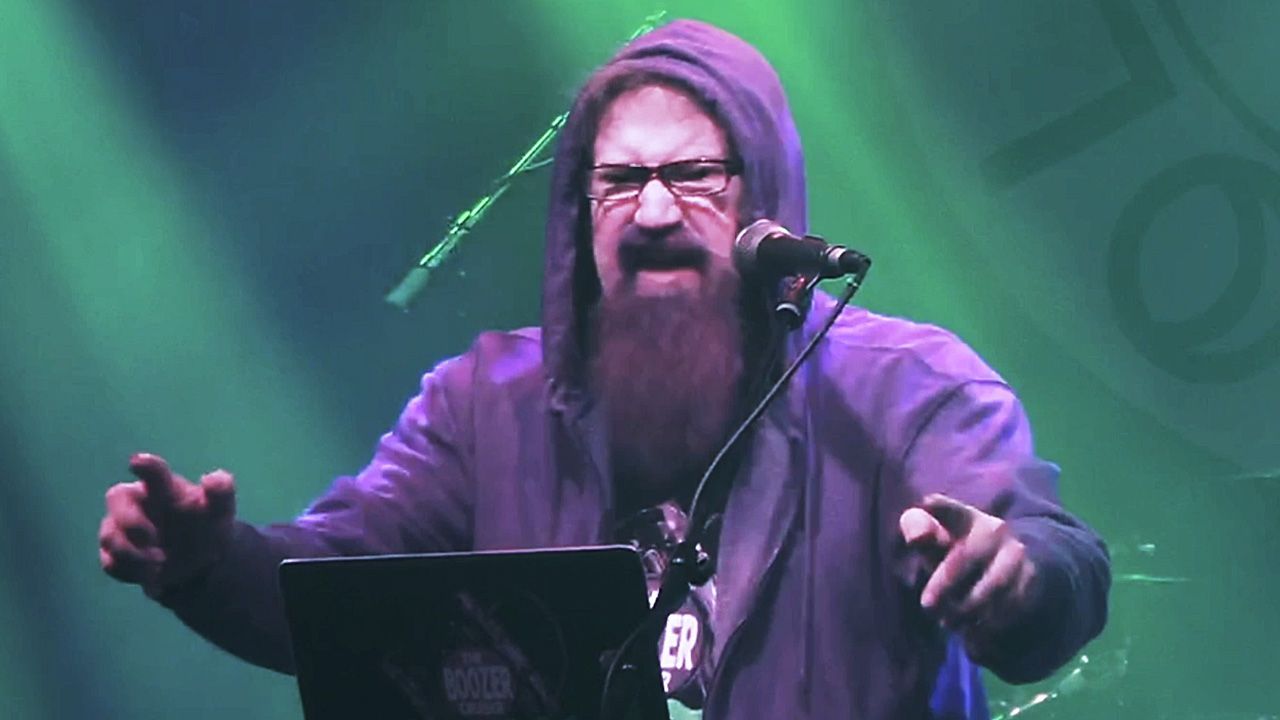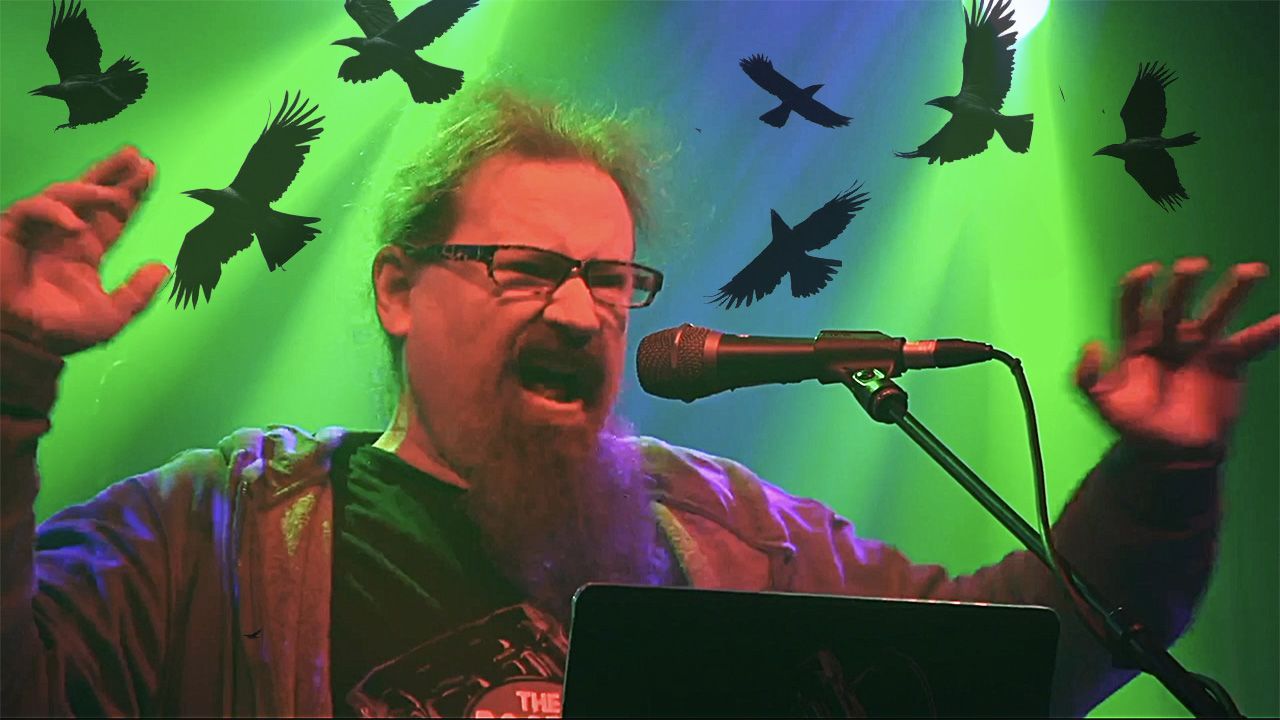The exploding talent of my collaborator Laurie Glass: “With each new instrument I learn, I’m introduced to a new style of music”
100k views special: meet the student composer exploring “bad” art to learn everything he can – which I hope isn’t the reason he was inspired to write music for The Gilded Silver Boar

The musical maestro behind The Gilded Silver Boar is Laurie Glass, who came to work with me through one of those accidents of art. I’ve previously worked with his dad, Andy Glass of the neo-prog band Solstice – which also features his mum, Jenny Newman. I sent Andy a rough version of the Boar poem, and he showed it to Laurie, who found inspiration enough to want to write music for it.
I’ve seen Laurie perform on several instruments, and his band, Ocular, are a massively entertaining, inventive jazz-prog-rock-whatever machine. To be honest I wasn’t sure if Boar lent itself to that kind of music, but one of the greatest things I’ve learned in the Boozer Cruiser project is to be open-hearted about collaboration.
Sticking to that instinct paid off. When Laurie sent me part of his opening movement, it moved me. I knew my work was in safe hands. What he went on to do with the rest of the piece was even more life and art-affirming for me. Remember: even when experience tells you to be cautious, try to remain open-hearted anyway. That’s the right thing to do, and if others treat you badly for it, that’s on them and not on you (although yeah, sometimes it hurts).
Laurie is a busy man – he’s currently moving to London to study music composition at a conservatory – so while I’d hoped to mark the 100,000th view of Boar with something more personal, a traditional Q&A is the best we could muster. You can also hear his Boar composition without the vocals below, which I very much recommend.
I hope you’ll enjoy finding out a bit more about him. You’ll definitely be hearing a lot more about him…
• MK: You’re a member of the talented Glass-Newman family and I assume you’ve been surrounded by music, right?
Laurie: I think my earliest memory of music is my third birthday party in Grafton Regis Village Hall, where my parents put together a CD of blues, folk, reggae and ska songs – a lot of which I still enjoy listening to today. Around the same time, my brother first picked up the guitar, inspired by the same blues and rock music we heard around the house. He loved to wear his cycling shades and devil hat while playing!
• When did you start to play?
I was five years old when my mum first encouraged me to have a go at violin. It’s now my first instrument; I’ve also started teaching violin in secondary and primary schools in Milton Keynes – and in London soon.
Night on Bald Mountain by Mussorgsky was the first piece I played when I joined Milton Keynes Youth Orchestra aged 11. I really loved the dark and dissonant sounds that conveyed the Russian folklore behind the music. During my first year in Northampton County Youth Orchestra, I was hugely inspired by another Russian composition, The Iron Foundry by Mosolov – another programmatic piece (depicting a story, object or character) which is even more dissonant and chaotic sounding. It heavily features low brass as well as percussion: someone has to repeatedly hit an anvil with a hammer for several minutes!
• What’s the full list of instruments you play?
In chronological order: violin, trumpet/cornet, ukulele, voice (in my school choir), bass guitar, guitar, piano, flugelhorn, upright bass, mandolin, bouzouki, crumhorn (briefly), drums, viola, oud; and most recently the Irish low D whistle.
• Can you pick a favourite?
No! I’ve always said regarding my main three – violin, trumpet and bass – that I tend to go through phases of preferring one over the other. With each new instrument I learn, I’m introduced to a new style of music. With violin I began by playing folk music with my mum, then I went on to study classical with some of the best teachers in the country – Ruth Gapp, Jan Kaznowsk, Bojan Cicic, Micheal Rose and Simon Cartiledge.
Trumpet introduced me to jazz and coincided with me getting a CD player. I would listen over and over to Miles Davis, Louis Armstrong and Matthew Halsal, who are still some of my favourite trumpet players to this day. Bass introduced me to all sorts of different types of music including reggae, funk, rock and metal.
Learning a new instrument became a fun new way of coming at music from a new angle. My limiting factor is money and time – as is true for everyone – but if I could, I would try and learn every instrument.
• Is one more natural than another, or anything like that?
String instruments are very comfortable for me – but I think the violin is a very unnatural instrument. The posture, especially if done incorrectly, isn’t natural at all; that’s why so many players end up with injuries. But I feel by learning trumpet early on – which is different from the violin in every way – I have the advantage of understanding the breath control required for wind instruments. That meant picking up the low D whistle wasn’t as difficult as I’d expected.
I believe the instrument that feels most natural or comfortable to you will be the one you spend the most time with.
• How did you come to land on the musical path you’ve taken in recent years?
While studying GCSE and A-Level music at Sponne School, I realised my favourite part of the course was the composition component. After getting a computer with Logic Pro X on it, I began recording and writing original music whenever I had free time. It wasn’t until I started being encouraged to think about what I would do after my A-Levels that I realised it was possible to study for a composition degree.
I also really hated the idea of going to music college to just play one instrument for four years. Doing composition, I wouldn’t have to specialise in a single instrument.
My taste in music would already have been considered eclectic by most, but since I started thinking of myself as a composer, I started listening to music in a different way. I actively seek out new music and styles that the average listener would reject immediately – and in some cases wouldn’t even consider it to be music!
I’ve become increasingly interested in music that sounds ‘bad’ in order to see what I can learn by trying to understand what the artist/composer is trying to say.
• How would you describe what you do?
I would say I’m experimenting with sound. I’m so desperate to explore and learn as much as I can about what I don’t know or understand. Listening is one of the best ways of learning in all areas of life.
• What do you regard as artistic success?
Creating something that you’re happy with.
• Why (on Earth!) did you want to write for The Gilded Silver Boar?
Outside of music, I’ve been interested in literature, poetry and history for a long time, so it was really up my street. I’d never written music to compliment spoken word before, so I was really excited to attempt the challenge. The opportunity was presented to me early on in my gap year, where I was on the hunt for as many new composition projects as I could find, in order to help me develop as a composer – as well as to add to my portfolio.
• Was there a particular moment you thought, ‘That speaks to me; I can do something with that’?
First I was sent the draft text of the poem, which I read and enjoyed, but when you sent me the recording of you reading it, the character was brought to life! I was inspired by how you conveyed the betrayer’s guilt in the narration of his own story. I feel the majority of my music starts with a feeling, which I try to express as sound.
• What were your main intentions with the piece?
I wanted to mirror what I felt was being conveyed by your words and performance. The sense of this untold historic betrayal gave birth to the opening melody, first heard on the harp. I wanted the focus to be on the words, but still provide enough of an atmosphere to leave an impact. That’s is why I made the decision to open and close that entire piece with that first melody – it establishes a mood or setting and leaves the listener with that atmosphere after they’ve listened… I hope!
• Your piece is built up of several movements. What was the most important thing to keep across all of them?
The thing I tried to maintain as much as possible was the instrumentation, but I also tried to make each movement unique, reflecting what I thought the narrator felt at each moment.
• How do you feel about it now it’s done?
I’m really pleased with the way it turned out and – and its increasingly high viewer count on Youtube is only validating those feelings! That was never my motivation, though. I was happiest at the point when the video was posted; it was so satisfying to see the final product being shared with the world.
The project was also special to me as it’s the first piece I uploaded to my personal Spotify account. Hearing the music without the vocals is a different experience that I hope people enjoy as well – but to me the music is intended to accompany the words.
• Any high points you’d like people to listen out for?
There are a few – one is at the start of the third movement where a bouncing violin bow emulates the galloping of horses and increases the tension of the battle scene being described. Another is in the fifth movement, where the death of Richard III is represented by a monotonously repeated harp note, mimicking a funeral bell.
• What’s next for you?
I’m starting my four-year composition BMus at Trinity Laban Conservatoire for Music and Dance. I’m super excited to be in such an inspiring place, being surrounded by like-minded people and having access to the highest standard of composition teaching.
I’m playing in several very different bands and working on lots of very different composition projects, so expect to see nothing but more music coming from me. I would love to work on another of your pieces too!
• You can follow Laurie’s progress via Instagram and Spotify.

